|
|
|
Sort Order |
|
|
|
Items / Page
|
|
|
|
|
|
|
| Srl | Item |
| 1 |
ID:
097208
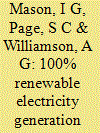

|
|
|
|
|
| Publication |
2010.
|
| Summary/Abstract |
The New Zealand electricity generation system is dominated by hydro generation at approximately 60% of installed capacity between 2005 and 2007, augmented with approximately 32% fossil-fuelled generation, plus minor contributions from geothermal, wind and biomass resources. In order to explore the potential for a 100% renewable electricity generation system with substantially increased levels of wind penetration, fossil-fuelled electricity production was removed from an historic 3-year data set, and replaced by modelled electricity production from wind, geothermal and additional peaking options. Generation mixes comprising 53-60% hydro, 22-25% wind, 12-14% geothermal, 1% biomass and 0-12% additional peaking generation were found to be feasible on an energy and power basis, whilst maintaining net hydro storage. Wind capacity credits ranged from 47% to 105% depending upon the incorporation of demand management, and the manner of operation of the hydro system. Wind spillage was minimised, however, a degree of residual spillage was considered to be an inevitable part of incorporating non-dispatchable generation into a stand-alone grid system. Load shifting was shown to have considerable advantages over installation of new peaking plant. Application of the approach applied in this research to countries with different energy resource mixes is discussed, and options for further research are outlined.
|
|
|
|
|
|
|
|
|
|
|
|
|
|
|
|
| 2 |
ID:
100880
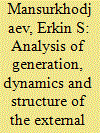

|
|
|
| 3 |
ID:
184580


|
|
|
|
|
| Summary/Abstract |
In 2016, a WeChat account called “Beijing Dama Have Something to Say” was created by a small Beijing-based company. Now widely known among retirees throughout China, this platform provides its public – mostly composed of recently retired women born between the late 1940s and the mid-1960s – with hundreds of videos where volunteer retired women speak up in the name of elderly people’s interests and spread awareness of their shared difficulties and injustices as a generation. Using ethnographic materials and video content analysis, this paper takes the “Beijing Dama” as a case study to address the development of new forms of “group consciousness” among Chinese retirees, leading them to defend their collective interests online despite China’s constraining political environment.
|
|
|
|
|
|
|
|
|
|
|
|
|
|
|
|
| 4 |
ID:
181399
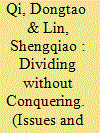

|
|
|
|
|
| Summary/Abstract |
Based on the literature about the role of rising nationalism in recent world politics, this paper proposes a nationalism-oriented causal model to explain the voting choices of different social groups. With an interest-identity framework, this generic model is applied to Taiwan’s 2016 presidential election to examine whether and to what extent 11 causal mechanisms influence the voting choices of four groups defined by generation, class, and ethnicity. The findings not only reveal generational, class-based, and ethnic differences in Taiwanese voting behavior; they also show that the election was largely one of identity politics centered around the issues of national identity and democratic identification, making the “interest card” played by Beijing less effective in swaying voter choices. This explains why Beijing’s divide-and-conquer economic policy successfully divided Taiwanese voters but failed in the end to prevent the pro-independence candidate from winning the election. The findings also indicate that the economic concerns of voters promoted both their Taiwanese identity and support for Taiwan independence, while identification with Taiwan’s democracy contributed directly to the former and only indirectly to the latter. Overall, the model presents a more fine-grained analysis of nationalist politics and may be applied to the studies of other political behaviors involving nationalism.
|
|
|
|
|
|
|
|
|
|
|
|
|
|
|
|
| 5 |
ID:
185977


|
|
|
|
|
| Summary/Abstract |
The literature on South Korean elections has shown that voters’ region, ideology, and generation shape their preferences at the polls. Few studies, however, have investigated the long-term effects of these variables or the difference in the effects of ideology and generation between regions. In this article, we generate theoretical expectations of Korean voters’ voting behavior, analyzing cleavage structures in the party system since democratization, and we then examine the interactive effects of region with ideology and generation across voters from Gyeongsang and Jeolla, in six presidential elections from 1992 to 2017. We find that ideology and generation have stronger effects among Gyeongsang voters than among Jeolla voters. To be specific, ideology and generation often divide Gyeongsang voters, especially when the Democratic Party nominates a presidential candidate from Gyeongsang; Jeolla voters are more homogeneous in their support for the party, regardless of their ideology and generation.
|
|
|
|
|
|
|
|
|
|
|
|
|
|
|
|
| 6 |
ID:
184579
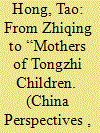

|
|
|
|
|
| Summary/Abstract |
This paper mobilises interactionist sociology to explore the biographies and moral careers of two former zhiqing who emerged, circa 2007, as well-known mother figures in a dynamic tongzhi blogosphere. Their encounter with young tongzhi inaugurated parental advocacy for their sexually nonconforming children in China. By anchoring tongzhi activism in contemporary Chinese history and reconstructing two parallel processes of activist-becoming, this paper seeks to better understand how political agency emerged in an authoritarian setting while making a case for studying activism as historicised meaning-making activities.
|
|
|
|
|
|
|
|
|
|
|
|
|
|
|
|
| 7 |
ID:
084335
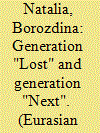

|
|
|
| 8 |
ID:
104358
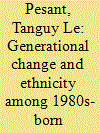

|
|
|
|
|
| Publication |
2011.
|
| Summary/Abstract |
This paper aims to show that Taiwanese born in the 1980s constitute a "post-reform" generation whose perception of cultural difference and ethnicity may challenge the efficiency of the "four major ethnic groups" categorization as an analytical framework for research on Taiwanese youth's identity, political behaviour and social interactions. Using quantitative data from a questionnaire distributed in 15 universities nationwide in 2010 and qualitative data from interviews, this paper first focuses on the attitudes of Taiwanese born in the 1980s toward what are generally considered the three core elements of ethnic group-making in a Chinese socio-cultural context: patrilineality, locality and language. Then it shows that the combined effects of democratization, Taiwanization and contacts with mainland China have decisively impregnated their life experiences and influenced their perceptions of cultural difference. Consequently, the different aspects/ factors that contributed to the formation and the deepening of ethnic boundaries and ethnic conflict up until the 1990s are not effective anymore, nor are they significant for Taiwanese in their twenties. This process is transforming ethnicity rather than erasing it. Thus "having an ethnic identity" is still considered important by a majority, but its meaning and salience have changed, leading to the necessity to redefine, a process that could be undertaken using the concept of "symbolic ethnicity".
|
|
|
|
|
|
|
|
|
|
|
|
|
|
|
|
| 9 |
ID:
158420
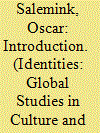

|
|
|
|
|
| Summary/Abstract |
As a fluid age cohort and a social category between childhood and adulthood – and hence with tenuous links to the status quo – youth are variously described as ‘at risk’, as victims of precarious and unpredictable circumstances, or as agents of social change who embody the future. From this future-oriented generational perspective, youth are often mobilised to individually and collectively imagine, enact and embody Utopian futures as alternatives to reigning orders that moulded their subjectivities but simultaneously fail them. The papers in this issue look at how divergent Utopias inspire strategies, whereby young people come together in transient communities to ‘catch’ a fleeting future, cultivate alternative subjectivities and thus assume a sense of minimum control over their life trajectories, if only momentarily. This special issue of Identities explores the individual and collective strategies at play when political and religiously inspired Utopias motivate youth in the Global South to imagine, enact and embody what was missing in the past and present.
|
|
|
|
|
|
|
|
|
|
|
|
|
|
|
|
| 10 |
ID:
160096


|
|
|
|
|
| Summary/Abstract |
As a fluid age cohort and a social category between childhood and adulthood – and hence with tenuous links to the status quo – youth are variously described as ‘at risk’, as victims of precarious and unpredictable circumstances, or as agents of social change who embody the future. From this future-oriented generational perspective, youth are often mobilised to individually and collectively imagine, enact and embody Utopian futures as alternatives to reigning orders that moulded their subjectivities but simultaneously fail them. The papers in this issue look at how divergent Utopias inspire strategies, whereby young people come together in transient communities to ‘catch’ a fleeting future, cultivate alternative subjectivities and thus assume a sense of minimum control over their life trajectories, if only momentarily. This special issue of Identities explores the individual and collective strategies at play when political and religiously inspired Utopias motivate youth in the Global South to imagine, enact and embody what was missing in the past and present.
|
|
|
|
|
|
|
|
|
|
|
|
|
|
|
|
| 11 |
ID:
084296
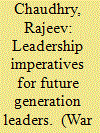

|
|
|
| 12 |
ID:
165870
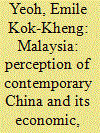

|
|
|
|
|
| Summary/Abstract |
This article looks at the Malaysian perception of the contemporary rise of China by focusing more on the country’s societal response rather than from a broad overall perspective of international strategic relations and diplomacy. The Malaysian society is seen as a complex multi-entity construct, constituted by often sharply differentiated fragments and sub-fragments which could exhibit vastly different responses to the implications of the rise of China. Within such a construct, perception of the rise of China and the appropriate Malaysian response are intricately entwined with domestic power politics, generational transition and governmental control over public discourse. Hence, the Malaysian perception of the contemporary rise of China is as complex as the Malaysian society itself, and what is revealed in official government policies and public discourses in the dominant mass media would fail to reflect the real depth of the issue if the intrinsic complexity of the Malaysian society is not taken into due consideration.
|
|
|
|
|
|
|
|
|
|
|
|
|
|
|
|
| 13 |
ID:
155075
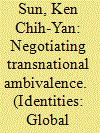

|
|
|
|
|
| Summary/Abstract |
This article uses older parents of parachute kids as an example to explore the ways in which the heads of transnational households assess intergenerational intimacy at a later stage of their life trajectories. I argue that transitioning to a later life stage motivates or even demands older parents reorient their perspectives on the separation from their children overseas. Specifically, I offer the concept of transnational ambivalence to analyse the processes whereby older parents grapple with the meaning of being physically separated from their children. This study demonstrates how the interplay between extended family separation and human ageing provokes complex feelings and emotions among parents. In addition, this research chronicles the factors that explain the variation in parental ambivalence. In so doing, this article contributes to the literature on transnational families by illuminating the temporal reflexivity of parents ‘left behind’.
|
|
|
|
|
|
|
|
|
|
|
|
|
|
|
|
| 14 |
ID:
113771
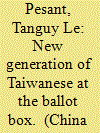

|
|
|
|
|
| Publication |
2012.
|
| Summary/Abstract |
The re-election of Ma Ying-jeou on 14 January 2012 was not as close as had been anticipated. This was in particular because he managed to win the support of some young voters, who at the beginning of the campaign were massively in favour of Tsai Ing-wen. In order to highlight the reasons why Taiwanese in the 20-to-29 age bracket changed their minds, this article analyses their perception of the two candidates, their main preoccupations, and their position in relation to the main themes of the campaign: the economic and social situation, identification with Taiwan, the island's international status, and relations with China.
|
|
|
|
|
|
|
|
|
|
|
|
|
|
|
|
| 15 |
ID:
184581
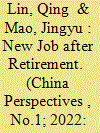

|
|
|
|
|
| Summary/Abstract |
Based on interviews with 120 adult only children and their parents in urban Tianjin, this article shows how grandparenting becomes a crucial site for the intergenerational negotiation around childcare, family obligations, and the unfulfilled aspirations for individualisation. While only child couples rely heavily on their parents for childcare, a lot of tensions are involved in this process. Although grandparents do not always willingly embrace the heavy burden of intergenerational childcare, their concern about elderly care sometimes compels them to nevertheless take up the work. Through providing a nuanced picture of grandparenting in urban China, this article seeks to reveal the changing ideas of family obligation and responsibility, as well as the social transformation in China that underpins such change. It argues that the individualisation process is far from finished, as reality is pulling people back to solve problems within the family.
|
|
|
|
|
|
|
|
|
|
|
|
|
|
|
|
| 16 |
ID:
180229
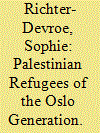

|
|
|
|
|
| Summary/Abstract |
This article analyzes the political narratives and critiques of young Palestinian refugees who have grown up in the bleak post-Oslo period. Based on ethnographic fieldwork and interviews conducted with refugee youth in Jordan and the West Bank between 2009 and 2014, I show that this generation of refugees endorses a collective Palestinian identity and peoplehood with claims to the (home)land while also narrating their identities and relations to land, nation, state, and rights as complex, multifaceted, and fractured. Their political imaginaries do not limit the political and epistemic project of decolonizing Palestine to the classic paradigm of a territorialized nation-state as enshrined in the Oslo two-state agenda. Rather, they point to a creative and radical, post-nation-statist, translocal politics for Palestine.
|
|
|
|
|
|
|
|
|
|
|
|
|
|
|
|
| 17 |
ID:
181813


|
|
|
|
|
| Summary/Abstract |
This article investigates how Nubian actors establish different memorial practices to transmit their culture and heritage in contemporary Egypt. The aim is to shed light on the heterogeneity of the Nubian community, thereby avoiding the dichotomy of the state official narrative versus a homogenized Nubian narrative. By mobilizing the sociology of collective memory and the sociology of social movements, this article aims to advance more reflection on the complexity of the remembering process. In order to explore how the memorial and cultural practices evolved in the last decade, I first present a historical background to explain to what the Nubian collective memory refers. By presenting critical discussions, I suggest using the space of the Nubian past because it enables us to understand better the dynamics and the diversity of the engaged actors. I highlight the generational factor, in the second part of this article, by illustrating how Nubian Youth are renewing their logics of action.
|
|
|
|
|
|
|
|
|
|
|
|
|
|
|
|
| 18 |
ID:
150350
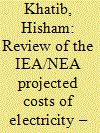

|
|
|
|
|
| Summary/Abstract |
The IEA/NEA recently issued their eighth edition of the Study on the “Projected Costs of Generating Electricity” – 2015 edition. The Study is mainly concerned with calculating the levelised cost of electricity (LCOE). The LCOE calculations are based on a levelised average life time cost approach using the discounted cash flow (DCF) method. The analysis was this year, and for the first time, performed using three discount rates (3%, 7%, and 10%). The LCOE can serve as a tool for calculating the cost of different generation technologies. However the Study's usefulness is affected by its narrow base of a limited set of countries that are not necessarily representative. It ignored the negative role of subsidies and did not provide a methodology for selective application of the discount rates and costing of carbon. The global power generation scene is changing. Generation growth in OECD countries has become very limited; simultaneously there is rapid growth of varying renewables (VRE) generation which needs special criteria for assessing its system cost. All this demands a rethinking of the application and usefulness of the LCOE in future generation planning.
|
|
|
|
|
|
|
|
|
|
|
|
|
|
|
|
| 19 |
ID:
120506
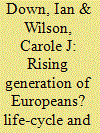

|
|
|
|
|
| Publication |
2013.
|
| Summary/Abstract |
Despite much research on age and attitudes, it remains unclear whether age reflects accumulated life experience or conditions prevailing during an individual's formative years - that is, a life-cycle effect or a cohort effect. In respect to attitudes towards the European Union (EU), the issue is particularly important. Although many analyses indicate a correlation between age and support, the relationship has not been adequately theorised and extant analyses have generated contradictory results. In this article, theoretical expectations for both life-cycle and cohort effects on support for the EU are developed and tested using a cross random effects model. This not only identifies the nature of an age-support relationship, but also highlights substantial generational differences in attitudes towards European integration and explains the inconsistencies in extant empirical analyses.
|
|
|
|
|
|
|
|
|
|
|
|
|
|
|
|
| 20 |
ID:
137946


|
|
|
|
|
| Summary/Abstract |
At the root of the West's conventional military dominance lie investment in and the operationalisation of advances in science and technology (S&T). However, with the funding behind this long-held military edge now being scaled back as part of a wider austerity drive, it is ever-more important that governments invest their money wisely and that new technology is operationalised as effectively as possible. John Louth and Justin Bronk draw on interviews with policy-makers, industry figures and military personnel as well as novel-technology case studies to argue for the ‘operationalisation’ of uncertainty in the early design stages of capability planning, thereby allowing for the inclusion of mature technology at a much later date.
|
|
|
|
|
|
|
|
|
|
|
|
|
|
|
|
|
|
|
|
|